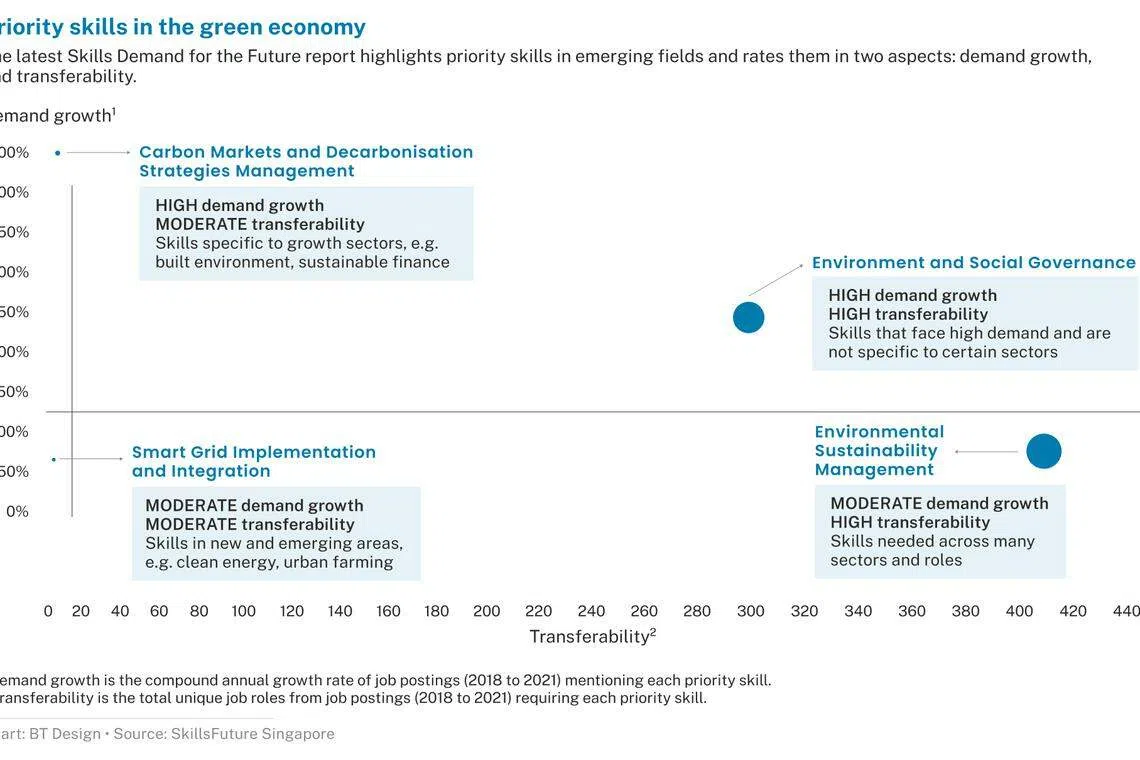SkillsFuture Series of short courses refreshed to focus on emerging fields, Industry 4.0

Tessa Oh
THE SkillsFuture Series of subsidised short-training courses will be reorganised to just four categories – the digital economy, care economy, green economy and Industry 4.0 – from Jan 1, 2023.
This marks a change from the current eight, which include advanced manufacturing, cybersecurity, and data analytics.
Three of the categories – digital economy, care economy and green economy – were identified in last year’s inaugural SkillsFuture Singapore (SSG) Skills Demand for the Future Economy Report as growth areas with increasing opportunities for Singaporeans.
The curated SkillsFuture Series is an example of how SSG is working with institutes of higher learning and private training providers to launch new quality courses to address the skills needs in these high growth areas, said Education Minister Chan Chun Sing on Tuesday (Nov 22) at SkillsFuture Fellowships and SkillsFuture Employer Awards Ceremony.
The second edition of the report was launched during the ceremony. It takes a deeper look at the “priority skills” needed in the three areas, rating them on two aspects: how much demand has grown since the pre-pandemic year of 2018, and whether they are transferable across different jobs and industries.
Workers can use the report to assess which skills they already have, and what skills they could seek to gain to become more employable, said SSG in a release. The report is a result of SSG’s work with workforce analytics firms to draw data from job portals and talent networks to identify new and emerging skills, said Chan.
Navigate Asia in
a new global order
Get the insights delivered to your inbox.
In the green economy, for instance, demand has grown the most for skills in green infrastructure and mobility – rising almost 200 per cent between 2018 and 2021 – as well as in energy, resource circularity and decarbonisation.
Examples of skills needed in green infrastructure and mobility include green facilities management, which might be needed by a building supervisor; electric vehicle and hybrid vehicle maintenance management, for an automotive technician; and climate-mitigating features in the built environment, for an architectural associate.
There is also growing demand for skills in sustainable finance, urban farming, food technologies and food development.
Highly transferable skills include those in environment and sustainability management, required in more than 400 roles across areas such as business development, engineering project development and facilities management.

In the digital economy, software development skills have the highest demand growth of 83 per cent between 2018 and 2021, as well as high transferability. These include software testing, user experience design and software design, for job roles such as software engineer, product designer and quality assurance tester.
In the future, more job roles will also require skills in e-commerce and digital marketing – such as customer experience management – as well as in artificial intelligence, data and analytics.
For the care economy, human resource advisory and career coaching were found to have both high demand growth and transferability.
This year’s report also looks at potential upskilling and career options for mid-career Singapore workers in their 40s and 50s, based on their existing work experience and expertise.
“We are keen to support them in job switches within the same sector or across sectors by highlighting possible upskilling pathways and available resources,” said Chan.
For example, they could take up new skills to enter jobs in the three high-growth economies; reskill for opportunities in roles adjacent to their current one; or upskill to stay relevant in their current role, he added.
Decoding Asia newsletter: your guide to navigating Asia in a new global order. Sign up here to get Decoding Asia newsletter. Delivered to your inbox. Free.
Copyright SPH Media. All rights reserved.

